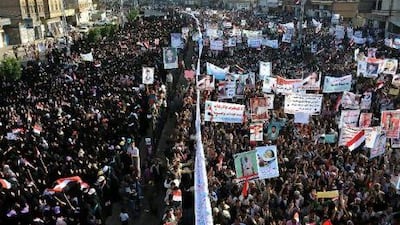WASHINGTON // With the killing last week in Yemen of two prominent Al Qaeda leaders in a single strike, the US military has shown that whatever other changes may be occurring in the region, its war with Al Qaeda proceeds regardless.
But the US has to reconcile its military priorities with a broader political stance that supports pro-democratic forces in the region. Nowhere is this a more difficult balancing act than in Yemen. Here, demonstrations against Ali Abdullah Saleh's regime, which have been joined by elements of the country's armed forces, are only the most obvious fault-line in a historically fractured and sectarian country.
The timing of the operation on Friday, one week after the return to Yemen of its president, Mr Saleh, also suggests that the leader's return was a factor in the mission. Certainly Barack Obama, the US president, was effusive in his praise for the role of the Yemeni government in Friday.
There is little doubt that Mr Saleh would use American military priorities for his own ends, determined not to be cast aside easily.
US officials have been careful to emphasise that there has been no change in policy on Yemen. Washington, the State Department said on Friday, still expects Mr Saleh to begin a transition of power sooner rather than later.
But since the June 3 assassination attempt on Mr Saleh in his presidential compound in Sanaa, Yemen's security forces have stepped up their cooperation with US intelligence and military operations in the country, said Christopher Boucek of the Carnegie Endowment for International Peace, a Washington think tank.
This, as well as helping the US find and kill Anwar Al Awlaki and Samir Khan, is partly an effort to show Washington that the regime is "an indispensable component in the fight against Al Qaeda", Mr Boucek said.
And it is partly an effort to deflect attention from the continuing violence that threatens to tear the country apart. Yesterday, two people were killed when a mortar landed near protesters who have been camping out in the centre of Sanaa. Since the beginning of the upheavals in the country in February, some 1,480 people have been killed, according to the Yemeni authorities.
The US says it continues to support a proposal by the Gulf Cooperation Council (GCC) that calls on Mr Saleh to agree to step down in 30 days in return for immunity from prosecution, and a transitional government made up of opposition parties to hold presidential elections two months later.
But Mr Saleh has stubbornly resisted the GCC's mediation efforts. He agreed to sign the proposal three times before the assassination attempt in June. On every occasion, he reneged at the last moment.
Although he again said he was ready to sign the initiative "as it is", in an interview published last week in the Washington Post, Mr Saleh also said it would only work if his opponents, General Ali Mohsen Al Ahmar, who has defected to the anti-regime demonstrators, and a senior member of the Al Ahmar clan, not related to the general, were also removed from their positions.
Mr Saleh then drew a straight line from his political opponents to the Al Qaeda in the Arabia Peninsula (AQAP).
"What we see is that we are pressed by America and the international community to speed up the process of handing over power. And we know where power is going to go. It is going to Al Qaeda, which is directly and completely linked to the Muslim Brotherhood," Mr Saleh.
It was as clear a sign as any that Mr Saleh is ready to play any card to help him in his domestic power struggle. The US, meanwhile, does not have a choice but to do the same, said Roby Barrett of the Middle East Institute.
Dr Barrett pointed out that the US is already mistrustful of General Mohsen Al Ahmar, who took a "live and let live" approach to radical elements in the past. Mr Saleh, an "incredibly sophisticated" politician, would "absolutely try to use the US to his advantage", he said.
And there are no clear options in a country where the current division within the regime is only the most obvious manifestation of a deeply fractious and divided society.
With a secessionist movement in the south, a rebellion by Al Houthis in the north, as well as Islamist militants all asserting their independence as central authority grows weaker, there is growing concern over regional stability, not least in Saudi Arabia, which shares a 1,800 kilometre border with Yemen.
Gulf, US and international interests are closely aligned in Yemen. Some 3 million barrels of oil daily pass through Bab El Mandeb, the strategic waterway linking the Red Sea and the Gulf of Aden at the southern tip of the country. With Somalia on the other side, instability in Yemen could seriously disrupt shipping through the strait and affect global oil prices and supply.
Yet, in spite of this alignment of interests, Mr Boucek said there was little sign that any long-term planning was being considered to assist Yemen develop into a stronger state. A stable future Yemen, Mr Boucek suggested, demanded closer economic and trade ties with the GCC, the only player "that can give Yemen what it needs".
Dr Barrett, however, said there was little use in looking beyond the immediate future in Yemen. The US and Yemen's neighbours need to accept that Yemen is "unfixable", he said. And the US is already working on that assumption.
"I think the US position is becoming more pragmatic by the day. That is to say, whoever - individuals within the government, the head of the government, local commanders - whoever supports efforts to ensure there aren't jihadis that, one, attack the US and, two, destabilise the region, we are going to cooperate with them."

